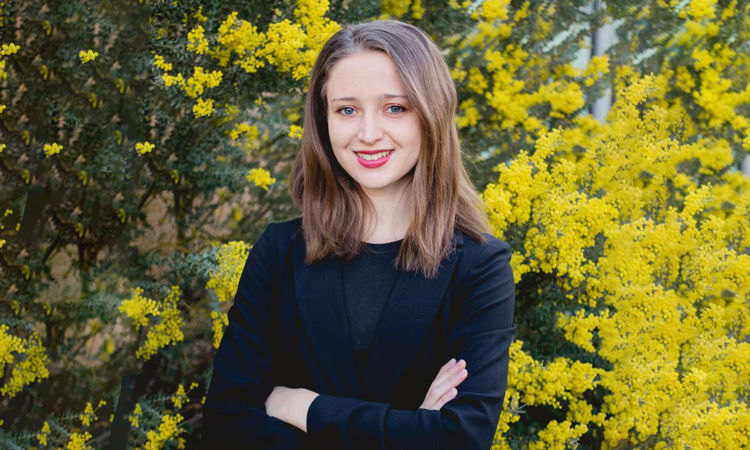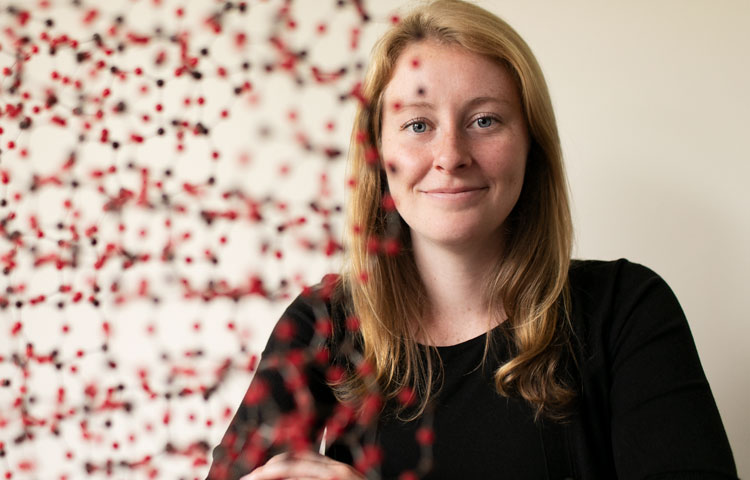Katya Marchetti has had her heart set on research since childhood. Today, she’s a bright, confident scientist making her dream a reality at Sanford Burnham Prebys.
Katya Marchetti, a first-year PhD student in the lab of Karen Ocorr, PhD, was recently awarded an Association for Women in Science (AWIS) scholarship. This competitive award encourages outstanding women pursuing degrees in science, technology, engineering and mathematics (STEM) fields at San Diego colleges and universities.
“Receiving this recognition highlights the importance of advocating for women’s empowerment in STEM and fostering an inclusive and diverse scientific community,” says Marchetti.
Marchetti grew up in Bakersfield California and finished her undergraduate degree from UC San Diego in just three years. Last year, she enrolled as a graduate student at 21 years old, making her one of the youngest PhD students to ever join the Institute. For her, the AWIS award is a culmination of a lifelong enthusiasm for science, inspired and encouraged by her family.
“I’m a very curious person,” says Marchetti. “I just inherently have to know how everything works, and my dad is the one got me inspired and interested in exploring things. I am so grateful for the opportunities that he fought for me to have, because he gave me everything that he didn’t.”
With the enthusiastic support of her family, Marchetti began her research career at the ripe age of nine years old.
“My first-ever science project was heart research,” she says. “My favorite song was “Kickstart My Heart” by Mötley Crüe, and I wanted to see if it would raise blood pressure. I tested myself and my family, and we actually found that it did, obviously.”
Today, Marchetti’s heart research is a bit more sophisticated. She studies hypoplastic left heart syndrome (HLHS), a rare disease in which the left side of the heart is underdeveloped and unable to effectively pump oxygenated blood to the rest of the body. HLHS is a congenital disease that is nearly always fatal without heart surgery. Marchetti’s research focuses on uncovering the genetics that underpin this disease to find new ways to prevent and treat it.
“Researching heart disease is very rewarding in and of itself, but it’s also really motivating to work on a disease that occurs in one of the most vulnerable populations,” says Marchetti.
Marchetti is also heavily involved on campus at the Institute, as one of just two graduate students to serve on the Institute’s Education and Training committee, part of the Institute’s Diversity Equity and Inclusion Council. She has also mentored interns for the Institute’s CIRM-sponsored SPARK program, which provides research experiences to high school students from underrepresented backgrounds.
“I really love mentoring people who don’t have a lot of lab experience,” says Marchetti. “It’s my favorite thing I’ve done in graduate school so far. I think that’s kind of my way of paying forward the opportunities that I’ve had.”
Marchetti will use the funds from the AWIS scholarship to further support her HLHS research. She also maintains that even after finishing her PhD, her long-term goal is to continue working in the San Diego research community.
“If were to describe myself as a city, it would be San Diego,” she says. “It’s really the perfect place for me.”

